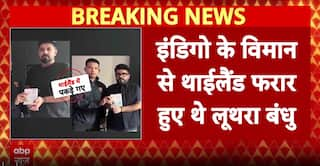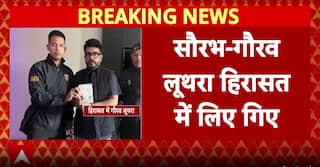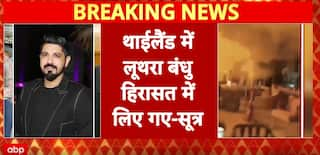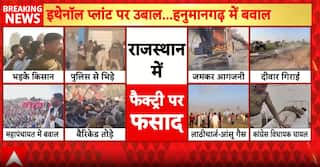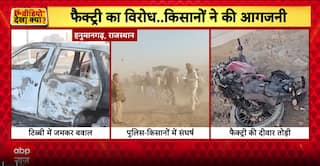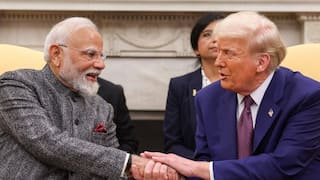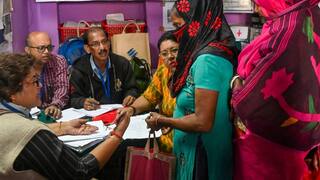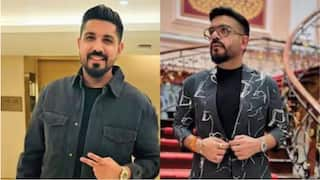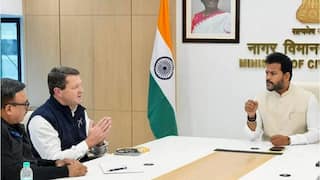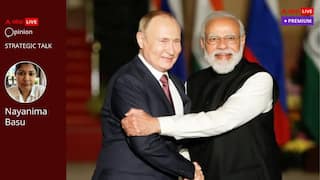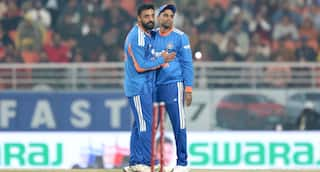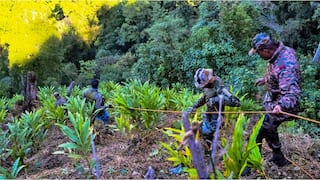'India Is Too Diverse To Have One National Language': Omar Abdullah Joins Debate On Hindi
Omar Abdullah said that religious freedom is a hallmark of democracy. India is a big democracy, but democracy cannot be done only in words but also in deeds.

New Delhi: Former Jammu and Kashmir Chief Minister and National Conference (NC) leader Omar Abdullah on Thursday attacked on the central government saying that India is a very diverse country in terms of a national language. The idea behind India is that it gives space to all.
Omar Abdullah said that religious freedom is a hallmark of democracy. India is a big democracy, but democracy cannot be done only in words but also in deeds. The atmosphere of control and intolerance is not good for the country.
भारत एक राष्ट्रभाषा के लिए बहुत विविध देश है। भारत का विचार यह है कि यह सभी को स्थान देता है। अगर भारतीय करेंसी नोट सभी भाषाओं को जगह देता है, तो यह समझा जाता है कि हम सिर्फ एक भाषा, संस्कृति और धर्म से बढ़कर हैं: उमर अब्दुल्ला, नेशनल कांफ्रेंस pic.twitter.com/P4F4RtlJWs
— ANI_HindiNews (@AHindinews) April 28, 2022
"India is too diverse a country to have one national language. The idea of India is that it gives space to everybody. When you pick up an Indian currency note, how many languages do you find on it?
"The currency note gives space to all the languages and if the Indian currency note gives space to all the languages, then obviously it is understood that we are more than just one language, more than just one culture, more than just one religion," he said, replying to a query on a recent controversy over the issue.
"We must give space to everybody. If we do not impose a language in Jammu and Kashmir, why should anybody do it? Let people choose. Why should there be a national language? I do not think a place like India needs a national language, we do not need a national religion. We need to give space to everybody," Abdullah said.
Inquired as to whether communalism had become standard and decisions are presently just battled about Hindu-Muslim issues, he said it was not something new "but now, there has been an increase".
"It has been mainstreamed like perhaps never before. That is true and it is unfortunate," he added.
To a question on whether he thinks Jammu and Kashmir's accession to India was a mistake given the circumstance the nation over now, the NC chief replied, nobody might have anticipated how the situation works out.
"Nobody could predict how things will play out. The accession was not a mistake. I do not believe India has irrevocably adopted this path. But it is a matter of concern. How can it not be? When you have processions outside mosques and there are slogans of 'is mulk mein rehna hai to jai shri Ram kehna hai' (if you want to live in this country, you will have chant jai shri Ram), what do you think people will feel?
"I am sorry, but when bulldozers are run over the houses of Muslims and television channel anchors say now there will be a dearth of bulldozers, we will have to import bulldozers, or there will be made in India bulldozers, how do you think we feel?" he asked.
ALSO READ: Madhya Pradesh: Former CM Kamal Nath Resigns As LoP, Govind Singh To Lead Congress In Assembly
"When television channel anchors climb on bulldozers and tell the driver that you have only destroyed the roof and the walls are still standing, you should destroy it as well, what do you think people will feel? Please understand that there are sentiments attached to this. We understand that politicians will do things for political motives, but people, who we expect will be impartial, when they take a partial position like this, how do you expect us to feel?" Abdullah asked.
Discussing the Assembly polls in Jammu and Kashmir and his comments on Wednesday that the People's Alliance for Gupkar Declaration (PAGD) should contest the election as an alliance, the NC chief said it is vital that "we put a stop to the detrimental changes that have been instituted in Jammu and Kashmir after August 5, 2019".
The Center revoked the provisions of Article 370 of the Constitution on August 5, 2019, and bifurcated the erstwhile state of Jammu and Kashmir into Union territories.
"And the best chance for success in that is for the PAGD to fight the polls together. But the ultimate decision obviously rests with the PAGD. They have to decide, I cannot decide for them," Abdullah said.
He, notwithstanding, added that he accepts there is a decent opportunity that the PAGD will challenge the political decision as an alliance.
"Ultimately, it is a decision that they will have to take and again, all this is premature speculation. We do not know when they will have the election, if at all. When they do, we will address these issues," the former Union minister said.
Found out if his comments on the alliance were provoked by a meeting between People's Democratic Party (PDP) chief Mehbooba Mufti and Congress president Sonia Gandhi in Delhi, Abdullah said everything should not be looked at through the prism of the PAGD.
"She (Mufti) is free to meet anyone she wants. Why must everything she does be looked at from the prism of the PAGD? The same way when (NC president) Farooq Abdullah visits some place, holds programmes, gives speeches, it is not all within the purview of the PAGD. He goes and attends programmes of the DMK. Recently, he was in their programme in Delhi, I was in Chennai.
"We are individual parties also and individual parties do their own work. So I am sure that the meeting (between Mufti and Gandhi) was fruitful, but it does not have to be seen through the prism of the PAGD," he said.
Inquired as to whether he thinks the Bharatiya Janata Party (BJP) will pose a challenge to his party in the Jammu and Kashmir Assembly polls, the former chief minister said each political decision is a test, however, the thought is "o stop the onslaught that began on Jammu and Kashmir on August 5, 2019".
(With PTI inputs)










